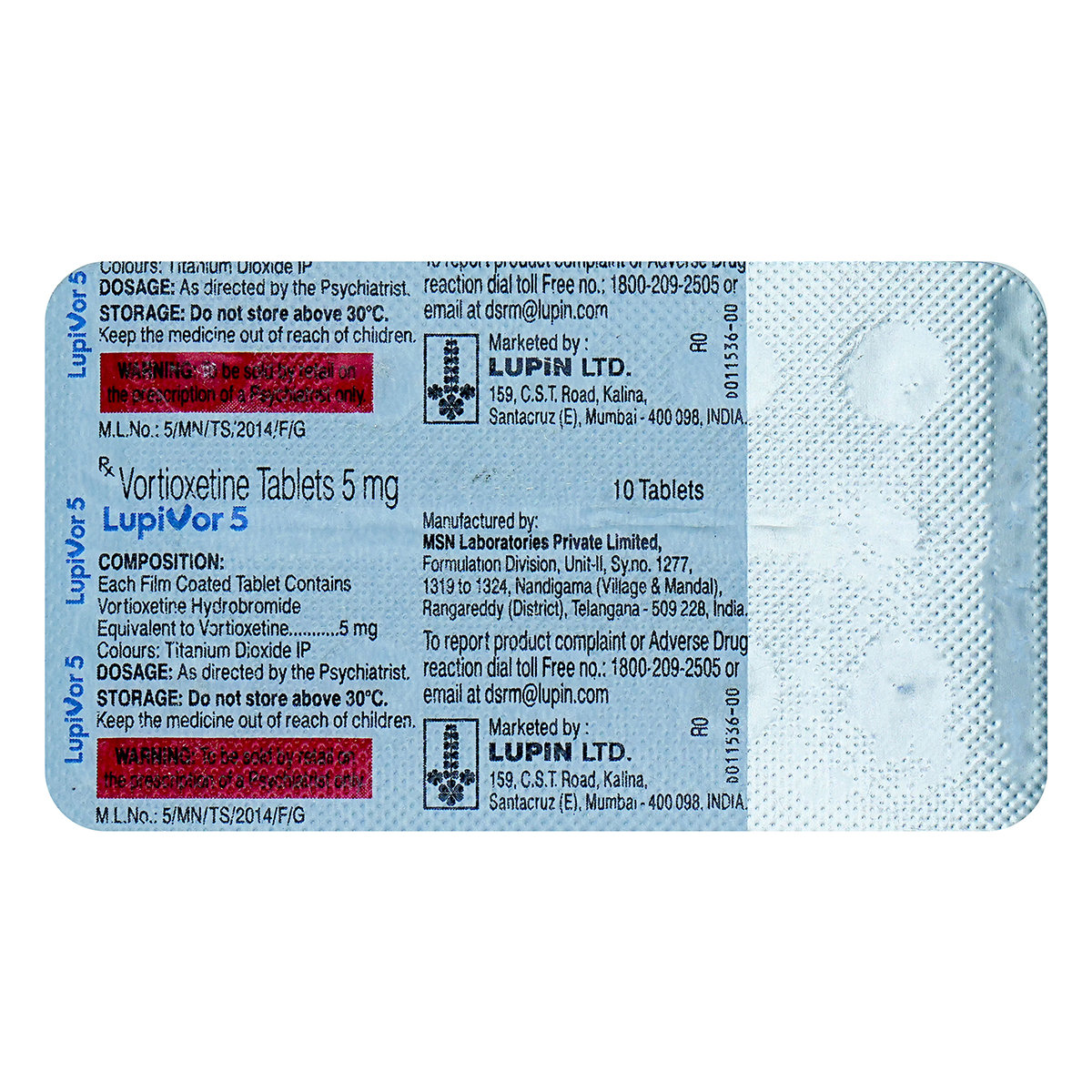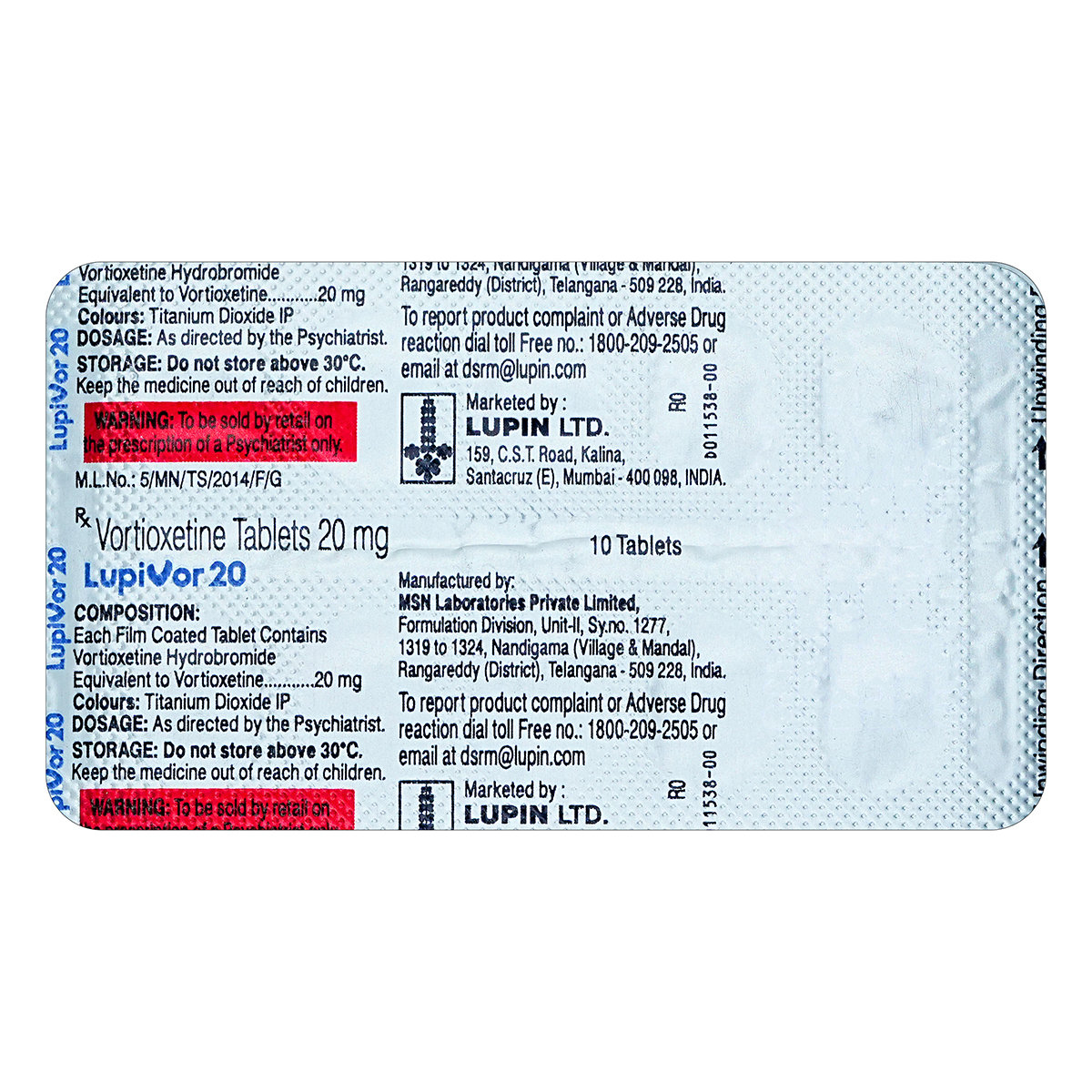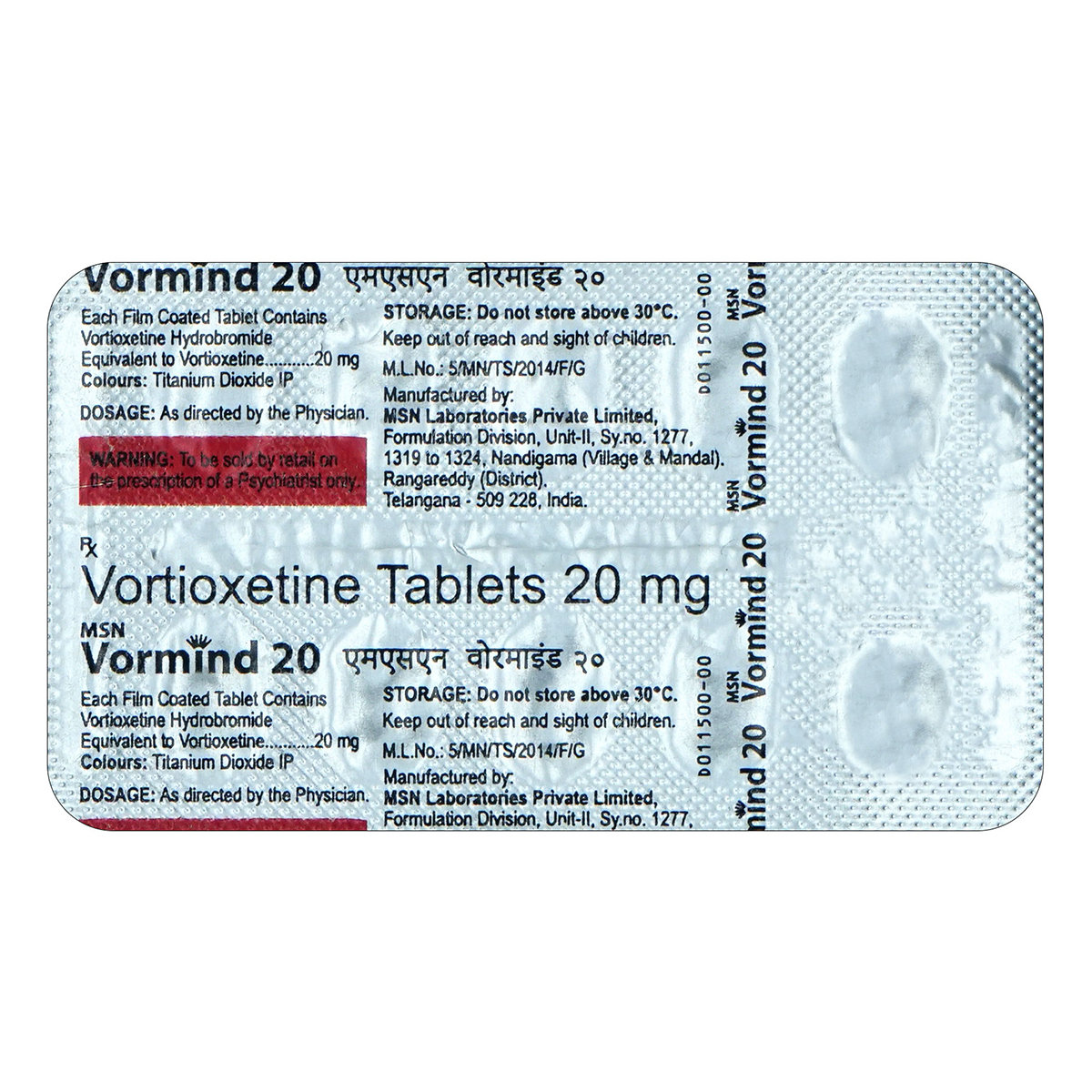Vortioxetine
About Vortioxetine
Vortioxetine is used to treat major depressive episodes in adults. Depression is a mood disorder that affects a person's daily life and is described as feelings of sadness, loss, or anger. These symptoms may interfere with your daily activities and affect your quality of life.
Vortioxetine contains vortioxetine, which works by increasing serotonin levels, present in the brain, responsible for energy, mood, and behaviour. Hence, an increase in these levels can effectively reduce the symptoms of depression.
Common side effects of Vortioxetine include abnormal dreams, constipation, diarrhoea, dizziness, itching, nausea and vomiting. These side effects usually go away after discontinuation of treatment. However, inform your doctor immediately if these side effects persist or worsen.
Your doctor will decide the right amount to control your symptoms based on your medical condition. Your treatment may be continued for at least six months after your symptoms resolve. Follow your doctor's instructions carefully while taking this medicine. It may take a few weeks before you start to feel better. Do not change the dose or stop taking medication, even if you feel well.
Taking Vortioxetine is not recommended if you are allergic to Vortioxetine or its contents. Elderly patients may require dose adjustments. If you are pregnant or breastfeeding, think you may be pregnant, or plan to have a baby, ask your doctor for advice before taking this medicine. Vortioxetine is not recommended for children and adolescents under 18 years due to insufficient data for this age group.
Uses of Vortioxetine
Medicinal Benefits
- Vortioxetine contains ‘vortioxetine’, an antidepressant that is effective and well-tolerated.
- It increases serotonin levels, a chemical in the brain responsible for energy, mood, and behaviour.
- Vortioxetine has been shown to reduce the broad range of depressive symptoms, including sadness, inner tension (feeling anxious), sleep disturbances (reduced sleep), reduced appetite, difficulty concentrating, feelings of worthlessness, and loss of interest in favourite activities.
Directions for Use
- Vortioxetine can be taken with or without food.
- It is usually taken once daily or as prescribed by your doctor.
- Swallow Vortioxetine as a whole with a glass of water.
- Do not crush, chew, or break it.
Side Effects of Vortioxetine
- Abnormal dreams
- Constipation
- Diarrhoea
- Dizziness
- Itching
- Nausea
- Vomiting
Drug Warnings
- It is not recommended to take Vortioxetine if you are allergic to Vortioxetine or its contents.
- Before taking Vortioxetine, inform your doctor if you have seizures (fits), head injury, severe liver, kidney, heart problems, diabetes, adrenal gland tumors, urination problems, glaucoma (an eye disease), and manic depressive illness or other mental disorders.
- Avoid taking alcohol, as it can cause excessive drowsiness.
- Elderly patients may require dose adjustments.
- Vortioxetine may cause drowsiness, so avoid driving or operating heavy machinery if you feel drowsy.
- If you are pregnant or breastfeeding, think you may be pregnant, or plan to have a baby, ask your doctor for advice before taking this medicine.
- Vortioxetine is not recommended in children and adolescents under 18 years due to a lack of information for this age group.
Drug Interactions
Drug-Drug Interactions: Vortioxetine may interact with medicines used to treat hyperactivity disorder (amphetamine/dextroamphetamine, methylphenidate, lisdexamfetamine), antidepressants (duloxetine, desvenlafaxine, mirtazapine, bupropion, sertraline), and medicines to treat seizures (lamotrigine, pregabalin).
Drug-Food Interactions: No interactions found/established.
Drug-Disease Interactions: Vortioxetine should not be used in patients with severe depression, angle-closure glaucoma, bleeding, hyponatremia (a condition where sodium levels in the blood are lower than normal), mixed/manic episode.
Drug-Drug Interactions Checker List:
Safety Advice

Alcohol
unsafeYou are recommended not to consume alcohol along with Vortioxetine to avoid unpleasant side effects.

Pregnancy
consult your doctorCaution should be exercised, and it is advisable to consult a doctor before using it.

Breast Feeding
consult your doctorCaution should be exercised, and it is advisable to consult a doctor before using it.

Driving
unsafeDrive with caution. Vortioxetine usually causes drowsiness and affects driving ability.

Liver
consult your doctorThere is limited information available on the use of Vortioxetine in patients with liver disease. Please consult your doctor.

Kidney
consult your doctorThere is limited information available on the use of Vortioxetine in patients with kidney disease. Please consult your doctor.

Children
unsafeVortioxetine is not recommended in children and adolescents under 18 years due to a lack of information for this age group.
Habit Forming
Diet & Lifestyle Advise
- Regularly attend therapy sessions.
- Perform meditation and yoga. This helps in relieving stress and provides relaxation.
- Follow a regular sleep pattern to improve the amount and quality of sleep you get.
- Include foods rich in omega fatty acids such as fish, nuts, fresh fruits, vegetables, and olive oils.
- Neurotransmitters are made up of amino acids. Amino acid-rich foods such as meat, dairy products, and certain fruits and vegetables help in the proper maintenance of neurotransmitters.
- Complex carbohydrates help in stimulating serotonin (a feel-good neurotransmitter). These include whole grains, legumes, spinach, broccoli, oranges, and pears.
- Exercising helps in the production of the body’s natural antidepressants. It also helps in relieving stress, improving mood, boosting self-esteem, and provides restful sleep.
- Avoid smoking and alcohol consumption.
- Learn about your condition, understand the risk factors, and follow the doctor’s treatment plan.
Special Advise
- Inform your doctor that you are taking Vortioxetine before undergoing any surgery, medical or dental treatment.
- Do not discontinue the treatment abruptly without discussing it with your doctor. The doctor gradually reduces the dose before completely stopping the treatment from avoiding withdrawal reactions.
Patients Concern
Disease/Condition Glossary
Depression: It is a mood disorder characterized by the persistent feeling of sadness, unhappiness, anger, hopelessness, or loss that interferes with a person’s daily activities. Depression can also influence some chronic health conditions and relationships. In this condition, neurotransmitters (chemicals in the brain) such as dopamine, serotonin, and noradrenaline levels decrease, resulting in symptoms of depression. The exact cause of depression is unknown, but it may be associated with mental problems, trauma, family history, drug use, and medical conditions. Counselling (psychotherapy) and antidepressants can be used to treat depression.
FAQs
Vortioxetine is used to treat major depressive episodes in adults. It helps to reduce depressive symptoms, including sadness, inner tension (feeling anxious), sleep disturbances (reduced sleep), reduced appetite, difficulty concentrating, feelings of worthlessness, loss of interest in favourite activities, and feelings of being slowed down.
Vortioxetine contains vortioxetine that works by increasing serotonin levels, a chemical present in the brain responsible for energy, mood, and behaviour. Hence, an increase in these levels can effectively reduce the symptoms of depression.
No, it is a prescribed drug given by a physician for preventing specific medical conditions. Taking it on your own can cause unwanted side effects.
Sometimes drugs are not safe when you take them with certain other drugs and food. Taking them together can cause unpleasant side effects. Therefore, please inform your doctor about all the medicines you are using.
No, please do not stop taking Vortioxetine even if you feel better, as it may worsen your condition. For the best advice, consult your doctor.
No, Vortioxetine is not a habit-forming drug. Take Vortioxetine in the prescribed dose and duration.
Vortioxetine is not recommended for children and adolescents under 18 years due to insufficient data for this age group.
You may notice the benefits of Vortioxetine within 2-4 weeks. Keep taking Vortioxetine for the prescribed duration to treat your condition effectively.
Vortioxetine contains vortioxetine, which belongs to the class of anti-depressant medications called serotonin modulators.
Common side effects of Vortioxetine include abnormal dreams, constipation, diarrhoea, dizziness, itching, nausea and vomiting. These side effects usually go away after discontinuation of treatment. However, inform your doctor immediately if these side effects persist or worsen.
Vortioxetine is unlikely to cause weight gain than other anti-depressant medicines. However, maintain proper weight by eating healthy food and exercising regularly.
Vortioxetine can be taken in the morning or at night. However, it is advised to take Vortioxetine as prescribed by the doctor.





